
Handling probate in California can feel overwhelming, especially if you have never done it before. Every county follows the same legal framework but has its own local rules, forms, and timelines. This guide explains exactly how probate works in California, what steps you must take, and how long it usually takes to close an estate.
You will learn how to file probate, what forms to use, how to calculate fees, and when you can handle probate yourself. Each section provides clear answers based on California law and official court resources.
In California, more than 60% of estates require some level of probate, and average cases last 9 to 18 months. Executors often face over 100 filing, notice, and record-keeping tasks throughout the process.
Source: National Center for State Courts (NCSC)
Probate is the court-supervised process that ensures a deceased person’s assets are collected, debts are paid, and the remaining property is distributed according to the law. The California Probate Code (7000-7350) defines this process and the duties of executors and administrators.
The court’s main role is to validate the will (if there is one), appoint an executor or administrator, and oversee the estate’s administration until everything is settled.
Probate is typically required in California when the value of the estate exceeds $184,500 and the assets are titled solely in the deceased person’s name. If the estate is smaller, the executor may qualify for a simplified procedure called Summary Probate.
According to the California Courts Self-Help Center, probate is required whenever property must be legally transferred under court supervision.
Some assets bypass probate entirely, such as:
The official petition to open probate (Form DE-111) and all related filings are available through the Judicial Council of California. Each step below follows the guidance outlined in the California Courts Probate Guide.
Simple estates: 6 to 9 months
Typical estates: 9 to 18 months
Complex estates: 18 months or longer
The average probate case in California takes between 9 and 18 months depending on the size and complexity of the estate, according to recent data from the National Center for State Courts (NCSC). Larger counties such as Los Angeles or San Francisco may take longer because of high caseloads.
Cases may take longer if:
Most California estates spend between 3% and 7% of total estate value on probate costs. Filing fees typically range from $435 to $1,000, as listed by the California Superior Court fee schedules. Executor and attorney fees follow the percentages defined under Probate Code 10800.
Typical fees include:
Probate in California follows a statutory fee schedule that defines how much executors and their attorneys can be paid. These fees are set by California Probate Code 10800 and apply to the total gross value of the estate, not just the liquid cash.
Current statutory fee rates:
Example: If an estate is worth $600,000, both the executor and the attorney are each entitled to $15,000 in statutory fees (4% of the first $100k, 3% of the next $100k, and 2% of the remaining $400k).
In addition, courts may approve extraordinary fees for special services such as selling real property, handling tax issues, or resolving litigation. These are generally billed hourly and must be justified to the court.
Traditional law firms in California charge according to this schedule, meaning costs often rise with the size of the estate. Alix works differently, offering a flat, predictable fee that covers the same filings, court coordination, and communication for one fixed price.
Yes. In California, executors can represent themselves in probate court if the estate is uncontested. This is known as pro se representation.
However, probate involves strict rules, deadlines, and legal paperwork. Even a small mistake can delay the process for months or lead to rejected filings. Many executors choose professional assistance to ensure accuracy and compliance while avoiding high attorney fees.
California law allows individuals to represent themselves in probate court if the estate is uncontested. The California Courts Self-Help Center confirms that executors can file documents, publish notices, and appear at hearings without an attorney
The California Judicial Council provides all official probate forms online. The most common ones include:
You can find all official forms at California Courts Probate Forms.
Probate cases are handled by the Superior Court in the county where the deceased person lived.
You can locate your local probate court here:
Find My California Superior Court
If the estate’s total value is under $184,500, you may qualify for Summary Probate, also called “Small Estate” or “Simplified Procedure.” Details are outlined by the California Courts Small Estate Guide, which explains how to use simplified procedures and required forms.
This process typically takes a few months and requires fewer court hearings. Executors can often file a Small Estate Affidavit instead of going through formal probate.
Do all estates have to go through probate in California?
No. Small estates under $184,500 may qualify for summary procedures. Assets held in trusts or joint ownership usually transfer outside probate.
How long after death do you have to file probate?
California law requires probate to be filed within 30 to 60 days after locating the will or confirming that there is no will.
Can probate be avoided with a trust?
Yes. The State Bar of California confirms that assets held in a revocable living trust bypass probate entirely.
What forms are needed to start probate?
You will need Form DE-111 (Petition for Probate), Form DE-147 (Duties and Liabilities), and Form DE-160 (Inventory and Appraisal).
Who pays probate costs?
All probate costs are paid from the estate’s funds, not by the executor personally.
What happens if there is no will?
If someone dies without a will, the court applies California’s intestate succession laws to determine who inherits the property.
Lorem ipsum dolor sit amet, consectetur adipiscing elit, sed do eiusmod tempor incididunt ut labore et dolore magna aliqua. Ut enim ad minim veniam, quis nostrud exercitation ullamco laboris nisi ut aliquip ex ea commodo consequat. Duis aute irure dolor in reprehenderit in voluptate velit esse cillum dolore eu fugiat nulla pariatur.

Block quote
Ordered list
Unordered list
Bold text
Emphasis
Superscript
Subscript

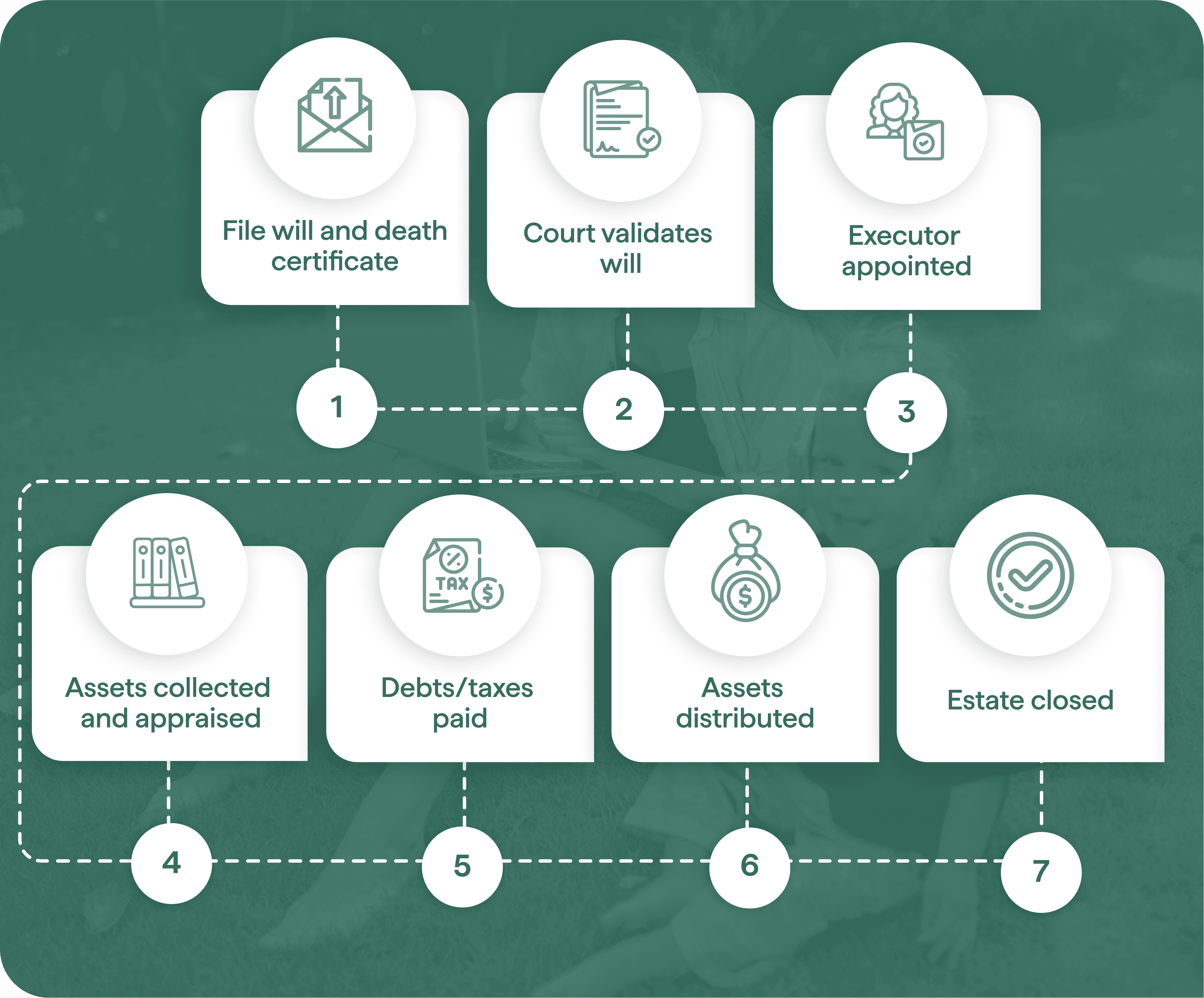
If the person left a will, the court confirms that the document is valid and appoints the person named as executor to carry out its instructions. If there is no will, the court assigns an administrator to manage the estate under state inheritance laws.
Probate involves several responsibilities, such as:
The process provides legal protection for everyone involved: beneficiaries receive what they are owed, and executors or administrators are shielded from personal liability if they follow court rules.
In some states, small or uncomplicated estates can qualify for simplified procedures, allowing the executor to skip formal hearings or use affidavits instead of full filings. However, larger or contested estates almost always go through formal probate.
Do all estates go through probate?
Not necessarily. Assets held in trusts, joint accounts, or with named beneficiaries can often transfer directly without court involvement.
Who is responsible for handling probate?
The executor named in the will, or if none is named, a court-appointed administrator. Their duties include collecting assets, paying debts and taxes, filing court paperwork, and keeping heirs informed throughout the process.
Probate is usually required when the person who passed owned assets solely in their name and no beneficiary is listed.
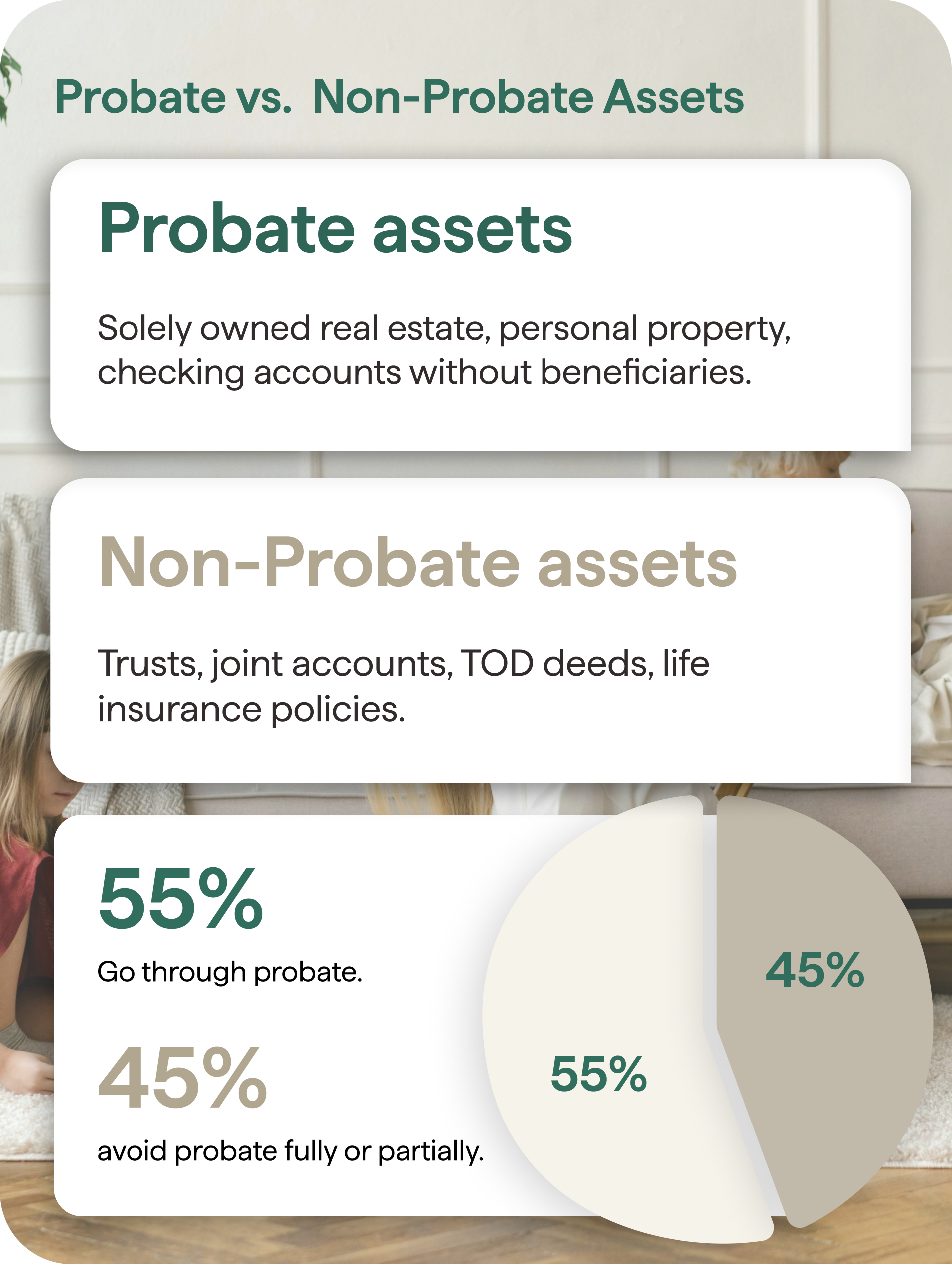
You can often avoid probate when assets are set up to transfer automatically at death. Common ways include:
The New York court system explains that if someone owned real property in their name alone, the estate is not a “small estate” and you must file a probate case (if there’s a will) or an administration case (no will). New York Courts: Small Estate / Voluntary
.png)
.png)
At a high level, the probate process follows these steps; forms and timing vary by state.

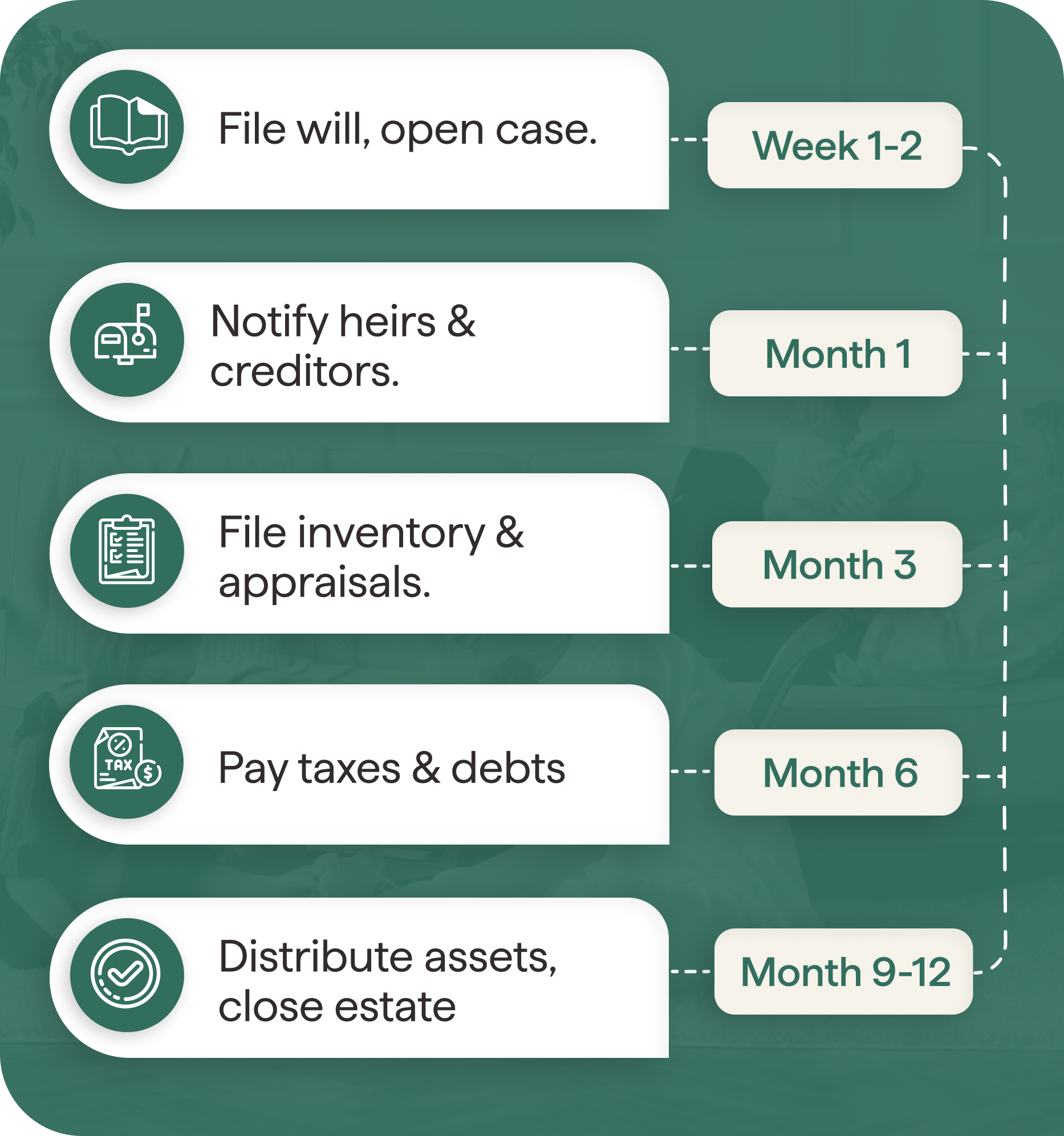
Submit the original will (if any) and certified death certificates to the probate court in the county where the decedent lived. The court opens a file and assigns a case number. Keep extra certified copies: banks and insurers will ask for them.
The executor named in the will (or an interested heir if no will) files a petition asking the court to start the case. If there’s no will, this is an administration case and the court appoints an administrator.
After appointment, the court issues Letters Testamentary (will) or Letters of Administration (no will). These documents give you legal power to act for the estate: open accounts, access records, sell assets with court approval if required.
Send required notices to heirs/beneficiaries and publish creditor notice if your state requires it. Track claim deadlines; late or missed notices can trigger disputes and penalties.
Locate accounts and property, secure the home, forward mail, and order appraisals where needed. Create the inventory the court requires: cash, real estate, vehicles, personal property, securities, insurance, retirement accounts, and debts owed to the estate.
Review and pay timely creditor claims, expenses, and taxes. File the decedent’s final Form 1040 and, if the estate has income, Form 1041 (fiduciary return). Keep receipts, your final accounting must document every dollar.
After debts and taxes are cleared (and any required court approvals obtained), transfer property to the heirs per the will or state intestacy laws. Get receipts/releases from beneficiaries.
Prepare a complete accounting of money in/out, provide it to beneficiaries (and the court if required), resolve objections, and request an order to close the estate. Keep records after closing in case of later questions.
As executor, you take on specific tax duties for the estate. See the IRS guidance for survivors, executors, and administrators for the full list and forms.
Most probate cases take 9-12 months, but timelines vary with estate complexity, disputes, real-estate sales, tax filings, and local court backlogs.

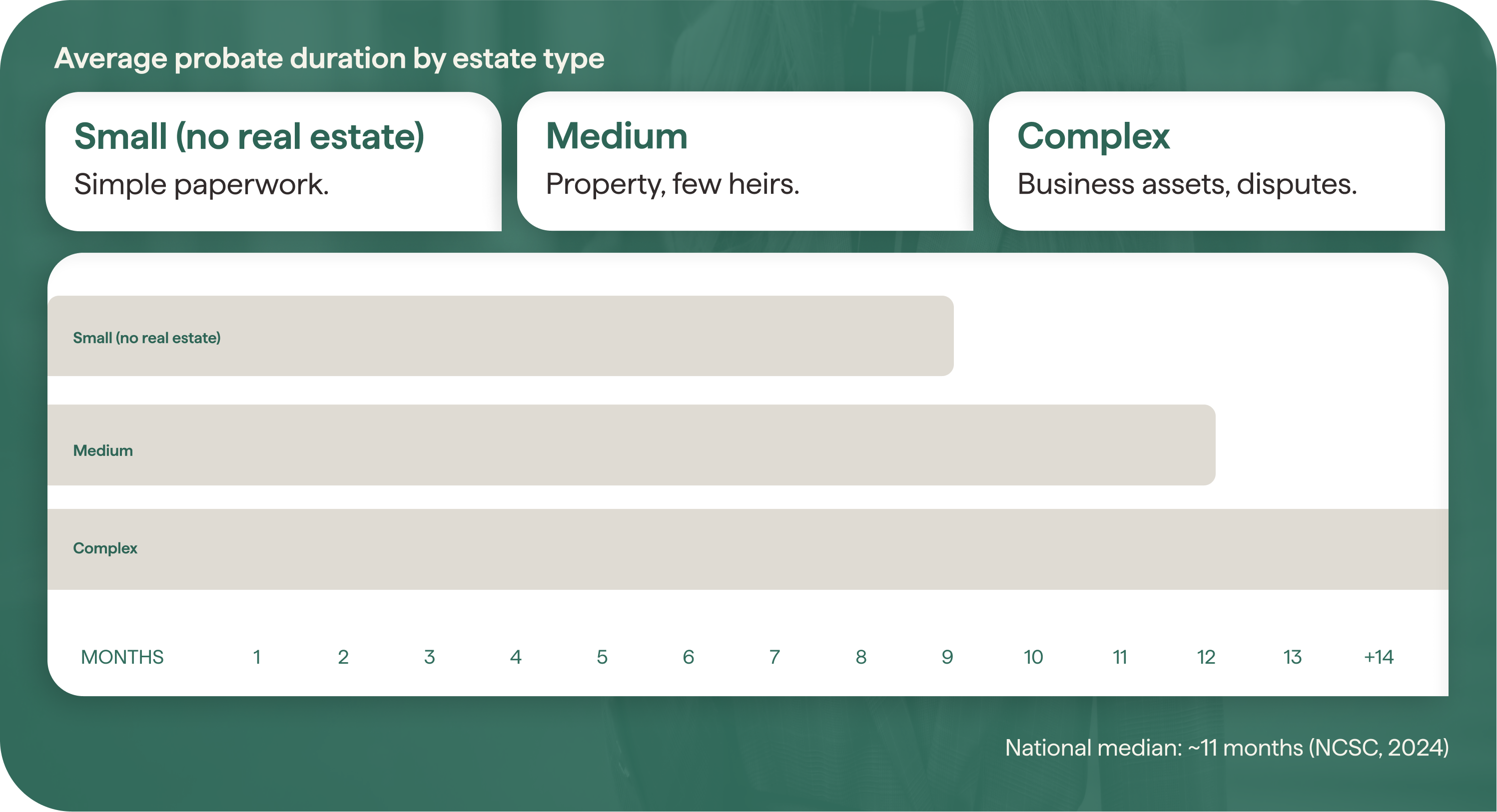
The timeline depends on:
Note: Simple estates with no disputes can finish in 6-9 months. Complex estates with property sales, debt, or tax filings can exceed 18 months. Missing documents are the #1 cause of delays.
Executors can check timeline averages on each state through the National Center for State Courts.
Probate costs typically range from 3% to 7% of the estate’s total value, depending on attorney fees, court filings, and appraisal requirements.
Common probate costs include:
All probate expenses are paid from the estate before any assets are distributed to heirs.
.png)
Probate runs smoothly when executors stay organized, timely, and transparent with beneficiaries.
While every estate follows the same general structure, executors often struggle with coordination and accuracy.
This section outlines how an organized approach keeps the process on track and reduces delays.
Executors can reference official guidance from the U.S. Government: After Death Resources..

Probate rules and filing fees vary across the U.S. While the core process is similar everywhere, timelines, forms, and court costs differ.
Sources:
Probate timelines vary widely depending on state laws, estate size, and the court’s workload. Always verify your local requirements through your state judiciary website before filing.
Executors can reference the National Center for State Courts Probate Data for nationwide statistics and trends.
Executors and families often share the same questions about probate timing, costs, and responsibilities. Below are concise answers drawn from official state and federal sources.
Probate is never simple, but it doesn’t have to be overwhelming.
Once you understand what’s required, who’s responsible, and how each step fits together, the process becomes much easier to manage.
Alix was designed to help executors stay organized, accurate, and compliant every step of the way.
Whether you’re just beginning or already partway through the process, we can guide you through forms, deadlines, and legal filings so nothing gets missed.
If you’re ready for expert guidance through every step, start here: book a free 15-minute consultation.
.png)
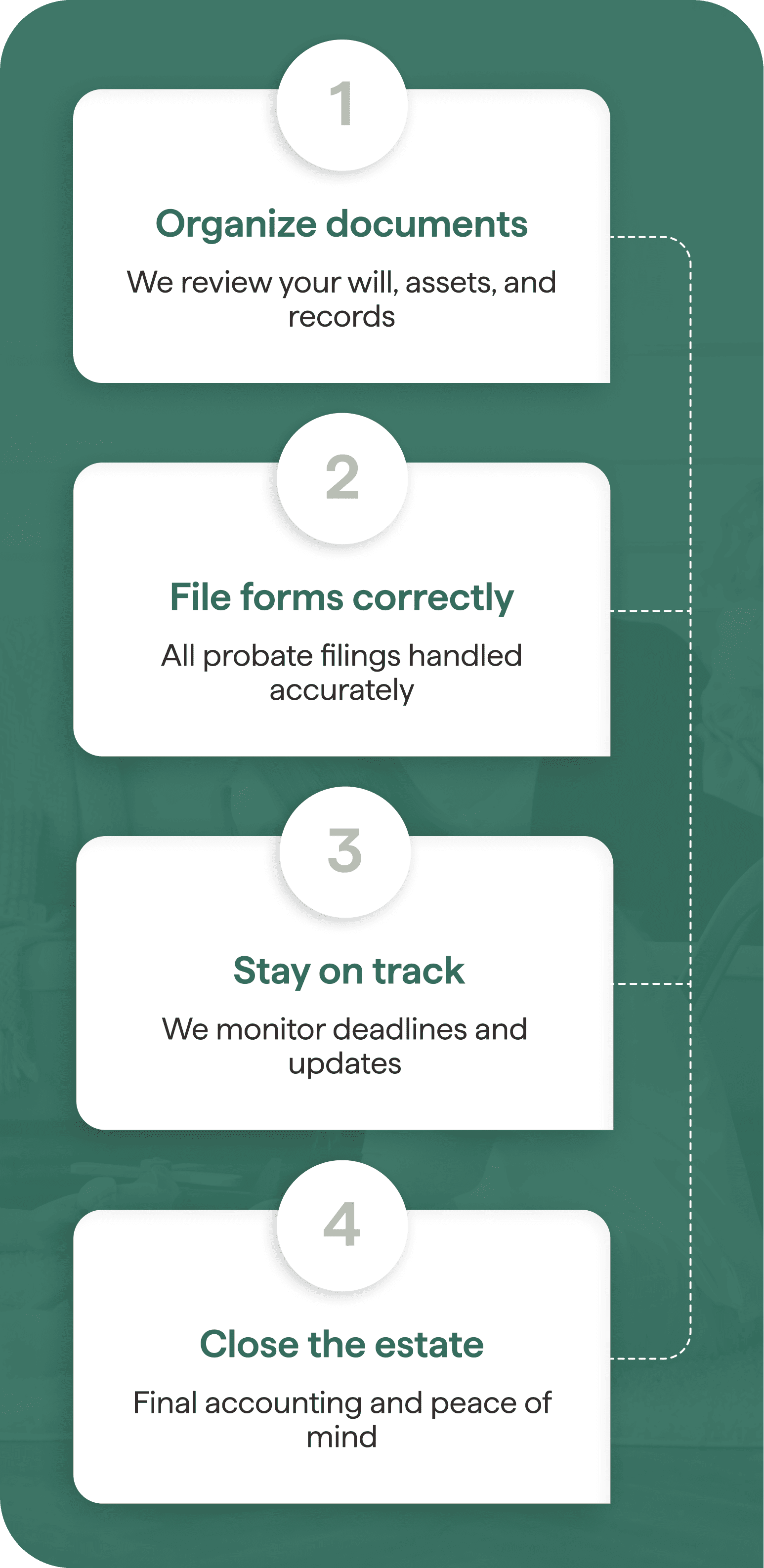
Lorem ipsum dolor sit amet, consectetur adipiscing elit, sed do eiusmod tempor incididunt ut labore et dolore magna aliqua. Ut enim ad minim veniam, quis nostrud exercitation ullamco laboris nisi ut aliquip ex ea commodo consequat. Duis aute irure dolor in reprehenderit in voluptate velit esse cillum dolore eu fugiat nulla pariatur.

Block quote
Ordered list
Unordered list
Bold text
Emphasis
Superscript
Subscript

Lorem ipsum dolor sit amet, consectetur adipiscing elit. Suspendisse varius enim in eros elementum tristique. Duis cursus, mi quis viverra ornare, eros dolor interdum nulla, ut commodo diam libero vitae erat. Aenean faucibus nibh et justo cursus id rutrum lorem imperdiet. Nunc ut sem vitae risus tristique posuere.
Author
Read Time
Category